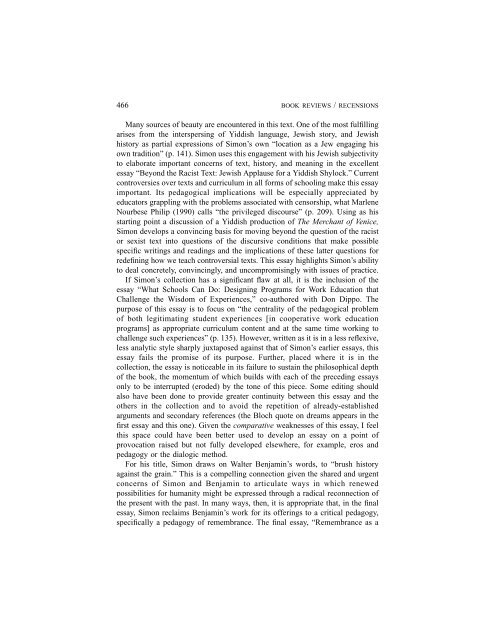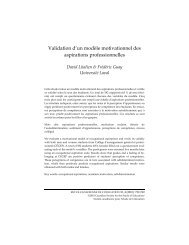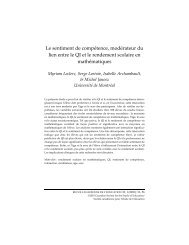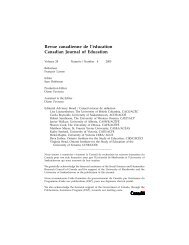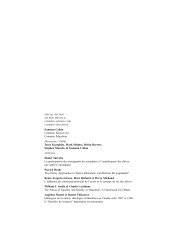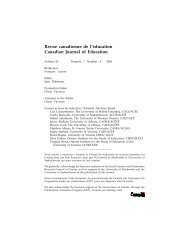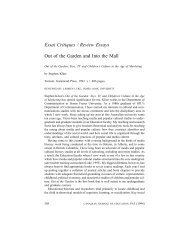Mireille Falardeau et Michel Loranger Le choix de stratégies ... - CSSE
Mireille Falardeau et Michel Loranger Le choix de stratégies ... - CSSE
Mireille Falardeau et Michel Loranger Le choix de stratégies ... - CSSE
Create successful ePaper yourself
Turn your PDF publications into a flip-book with our unique Google optimized e-Paper software.
466 BOOK REVIEWS / RECENSIONS<br />
Many sources of beauty are encountered in this text. One of the most fulfilling<br />
arises from the interspersing of Yiddish language, Jewish story, and Jewish<br />
history as partial expressions of Simon’s own “location as a Jew engaging his<br />
own tradition” (p. 141). Simon uses this engagement with his Jewish subjectivity<br />
to elaborate important concerns of text, history, and meaning in the excellent<br />
essay “Beyond the Racist Text: Jewish Applause for a Yiddish Shylock.” Current<br />
controversies over texts and curriculum in all forms of schooling make this essay<br />
important. Its pedagogical implications will be especially appreciated by<br />
educators grappling with the problems associated with censorship, what Marlene<br />
Nourbese Philip (1990) calls “the privileged discourse” (p. 209). Using as his<br />
starting point a discussion of a Yiddish production of The Merchant of Venice,<br />
Simon <strong>de</strong>velops a convincing basis for moving beyond the question of the racist<br />
or sexist text into questions of the discursive conditions that make possible<br />
specific writings and readings and the implications of these latter questions for<br />
re<strong>de</strong>fining how we teach controversial texts. This essay highlights Simon’s ability<br />
to <strong>de</strong>al concr<strong>et</strong>ely, convincingly, and uncompromisingly with issues of practice.<br />
If Simon’s collection has a significant flaw at all, it is the inclusion of the<br />
essay “What Schools Can Do: Designing Programs for Work Education that<br />
Challenge the Wisdom of Experiences,” co-authored with Don Dippo. The<br />
purpose of this essay is to focus on “the centrality of the pedagogical problem<br />
of both legitimating stu<strong>de</strong>nt experiences [in cooperative work education<br />
programs] as appropriate curriculum content and at the same time working to<br />
challenge such experiences” (p. 135). However, written as it is in a less reflexive,<br />
less analytic style sharply juxtaposed against that of Simon’s earlier essays, this<br />
essay fails the promise of its purpose. Further, placed where it is in the<br />
collection, the essay is noticeable in its failure to sustain the philosophical <strong>de</strong>pth<br />
of the book, the momentum of which builds with each of the preceding essays<br />
only to be interrupted (ero<strong>de</strong>d) by the tone of this piece. Some editing should<br />
also have been done to provi<strong>de</strong> greater continuity b<strong>et</strong>ween this essay and the<br />
others in the collection and to avoid the rep<strong>et</strong>ition of already-established<br />
arguments and secondary references (the Bloch quote on dreams appears in the<br />
first essay and this one). Given the comparative weaknesses of this essay, I feel<br />
this space could have been b<strong>et</strong>ter used to <strong>de</strong>velop an essay on a point of<br />
provocation raised but not fully <strong>de</strong>veloped elsewhere, for example, eros and<br />
pedagogy or the dialogic m<strong>et</strong>hod.<br />
For his title, Simon draws on Walter Benjamin’s words, to “brush history<br />
against the grain.” This is a compelling connection given the shared and urgent<br />
concerns of Simon and Benjamin to articulate ways in which renewed<br />
possibilities for humanity might be expressed through a radical reconnection of<br />
the present with the past. In many ways, then, it is appropriate that, in the final<br />
essay, Simon reclaims Benjamin’s work for its offerings to a critical pedagogy,<br />
specifically a pedagogy of remembrance. The final essay, “Remembrance as a


